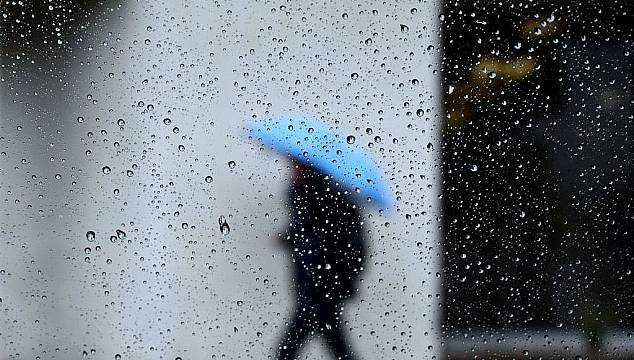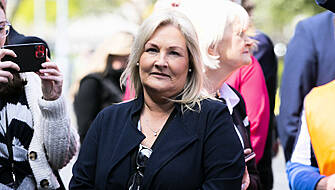With a noticeable shift in the past week to slightly darker evenings and colder and wetter weather, most of us have accepted our descent into the winter months.
The impact that weather and less daylight has on our mood cannot be understated, and we must actively fight against the urge to become socially isolated, according to Marie Duffy of Mental Health Ireland.
Duffy explained that the weather makes a huge difference, and colder weather and shorter days can bring on feelings of fatigue, lethargy and a general feeling of being down.
"If the weather is particularly dark or if it’s particularly wet, it can really take a toll on your mental health and your mood. The other thing is we tend to isolate ourselves when the weather gets colder and, with the shorter days, people are less likely to go out," she said.
"They're more likely to spend time indoors, and that can really impact someone who struggles with their mental health because social isolation is a huge thing, particularly in rural Ireland.
"We find that during the winter months, there can be times where people might not even leave the house for days at a time, and that can really impact someone's mood."
Duffy said we need to make an effort to meet up with friends and family during the winter months, even when it feels more tempting to take to the couch and watch television.
"Even if it's just meeting up to watch your favourite TV programme once a week with a friend, it's about pencilling that time into your diary.
"It needs to be just non-negotiable that you meet your friends or your family member at that time every week, and knowing that you have something in the diary can really make a big difference.
"Another thing would be if you're looking to meet new people - take a class. A lot of people take an evening class in the winter or take up a new hobby.
"So, whether that's art or whether it's a fitness class or an educational course, it's a great way of meeting new people. But it's also a great way of getting out of the house and just focusing on something fun."
Reach out to people and do not always wait for them to reach out to you, Duffy said.
"If you're feeling a bit lonely and you feel that you want to catch up with someone - send a text, make the call, don't always be waiting or assume that people are too busy for you.
"It's something that a lot of people do, they think: 'Well, if someone has time, they'll contact me'.
"But, that's not always the way. So make that call, send that text and try not to isolate yourself because it can really make a long winter much longer."
Daylight and SAD
Duffy explained that shorter days can really impact your circadian rhythm - the body's internal 24-hour cycle.
"There's a condition called seasonal affective disorder (SAD) which can impact anybody, and it's really about a lack of sunlight," she said.
"It can really impact somebody's mood, and it usually occurs during the winter months. People with depression or anxiety may find that their symptoms worsen during the winter months.
"One way of combating that is to try and get as much sunlight as possible and I know when people think of winter, they don't necessarily think of the sun, but it's not so much the sun, it’s the actual light.
"So even just spending an hour or so going for a walk during the daylight hours, particularly around midday when the sunlight is strongest, can really impact your mood positively, even if it's cloudy or if it's overcast."
According to the HSE, people suffering from SAD can experience low mood, irritability, low self-esteem, feeling lethargic and may have an increased appetite.
Sitting by a window or making sure that you have got natural light coming into your house, even if you cannot get outside, and keeping blinds or curtains open during the day to let as much light in as possible can really can impact your mood, Duffy said.
"But it also can impact your sleeping patterns. So when we're not getting enough natural sunlight it can impact our circadian rhythm, which impacts our sleep, which then has a knock-on effect on your mood.
"Another thing that a lot of people would suggest, living in Ireland or for anyone kind of in this climate or these temperatures, is to take a vitamin D supplement in the winter.
"We get most of our vitamin D from sunlight and because there's less sunlight in the winter, we have less vitamin D in our bodies. And so a lot of people can find a lot of benefit from having a vitamin D supplement and find that that can really help boost their mood as well."
Talk therapy
For people who are finding it hard to get out and about in nature or do their usual hobbies, Samaritans looks to provide the power of listening.
Volunteer with Cork Samaritans and deputy director of Samaritans Ireland, Aileen Spitere, said talking about how you feel can help put things into perspective.
“It's surprising the amount of times people say things and you sort of reflect it back and say: ‘It sounds like you're struggling’. And people say: ‘Oh, yeah, I suppose I am’.
"It's as if they need to hear it themselves or they need someone to sort of reflect it back. It's about giving people the time to talk about how they're feeling.
"A huge way to look after yourself is to actually talk to somebody, because I think the problem is some people find it quite difficult to talk when they're feeling down. They'll talk away like mad when they're in great form. But, when they're struggling, it can be hard because they don't want people to see them as ‘those type of people'.
"People to say to us : ‘I never thought I'd be the type of person who rings Samaritans’. And you say to them: ‘Well, everybody rings Samaritans, there’s just different times for different people’."
Spitere said all the advice given around wellbeing and mental health during the winter, like making an effort to do things you like, being with friends and getting outside, can just sound like noise to someone that is struggling to get out of bed in the morning.
"I think for them, picking up the phone and ringing, be it Samaritans or a friend or a member of the family, can be the most important thing they can do," she said.
“We listen to people and give them the time and space to talk about how they're feeling. And we do know that helps. Talking therapy is what we do and it's very simple. So maybe for us as human beings, it's important for us all to be heard."
On calling the Samaritans, Spitere said: “It’s free. It's confidential. You don't have to give your name. You don't have to say where you're ringing from. We can't see your number, and we provide a safe space.
"Sometimes people will say that what we do is actually hold people while they try and figure out how they're feeling, so it's about creating a safe space. We don't judge you, and we believe, and I very passionately believe, that that's an incredibly important thing to do."
You can freephone the Samaritans 24 hours a day for confidential support at 116 123 or email jo@samaritans.org.







